In the search for a new food processor, are you torn between Cuisinart vs KitchenAid food processors? Look no further!
This comprehensive comparison delves into the features, abilities, build quality, and price of Cuisinart vs KitchenAid food processors.
Whether you prioritize value for money or premium design and performance, we’ve got you covered in the ultimate showdown of Cuisinart vs KitchenAid food processors.
By the end of this article, you’ll have all the information you need to make an informed purchase that suits your cooking needs and preferences. Let’s dive in!
Key Takeaways
- Both Cuisinart and KitchenAid offer versatile food processors with various sizes and colors.
- Cuisinart has a more powerful motor and is better for heavy-duty chopping and dough mixing.
- KitchenAid has innovative features like the UltraTight seal system and ExactSlice system.
- Cuisinart is more affordable and offers a longer warranty range.
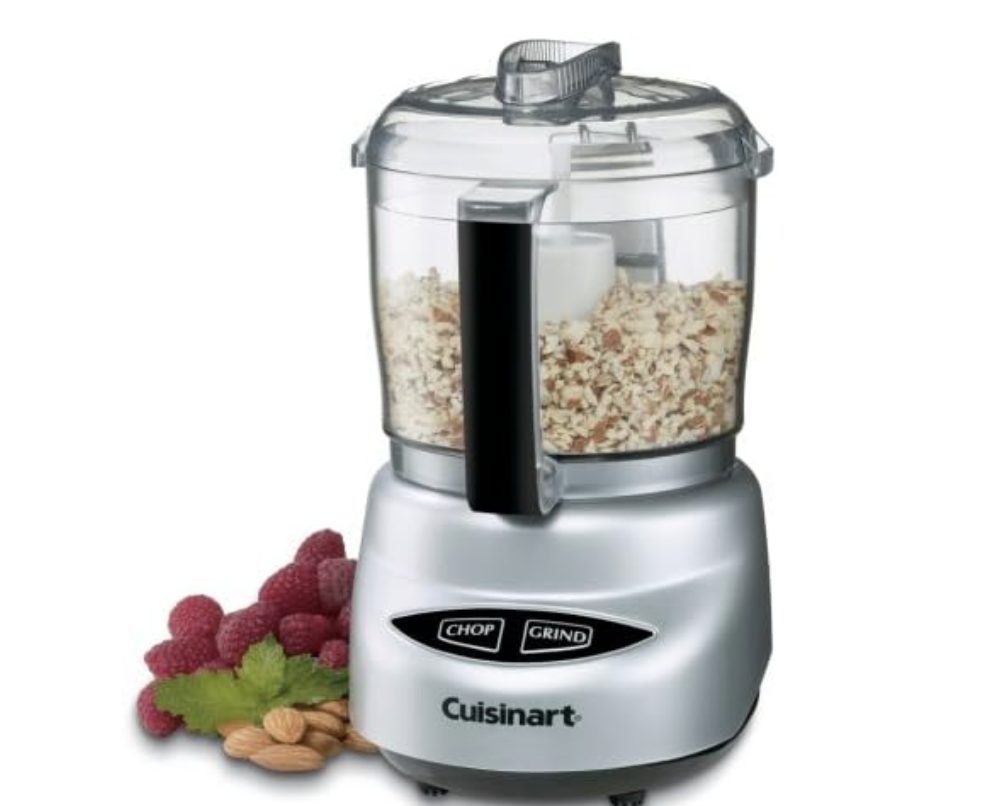
Cuisinart Food Processor: Overview
The Cuisinart food processor is a versatile kitchen appliance that offers reliable performance and value for money. It’s known for its durable build quality and sturdy construction.
With a powerful motor ranging from 350 to 720 watts, the Cuisinart food processor can handle heavy-duty tasks like kneading dough. It comes in various sizes and colors to suit different kitchen spaces and preferences.
 4.6
4.6$179.95$151.36Buy NowPros:- The 11-cup capacity strikes a good balance, making it suitable for both everyday use and larger meal preparations without occupying excessive counter space.
- Multifunctional Blades
- Durable Construction
- Powerful Motor
- Simple controls and a user-friendly design make it easy to operate, suitable for both experienced cooks and those new to food processors.
- Compact Design
- Easy to Clean
Cons:- Some users might find the feed tube slightly narrow, requiring more pre-cutting of larger ingredients.
- Limited Color Options
- Noisy Operation
- While not as expensive as larger, more feature-rich models, the Pro Custom 11 Cup processor might be on the higher end of the price spectrum for its capacity range.
- Limited Accessories
03/29/2025 08:01 pm GMT 4.6
4.6$249.95$199.95Buy NowPros:- The 14-cup capacity allows you to process substantial amounts of food at once, making it suitable for large families or when preparing meals for gatherings.
- Versatile Functionality
- Powerful Motor
- Made of stainless steel, the processor is not only durable but also resistant to rust and stains.
- Wide Feed Tube
- Removable parts are dishwasher-safe, simplifying the cleaning process and saving time on maintenance.
- Sturdy Design
Cons:- The large size of the 14-cup processor may pose a challenge for storage in smaller kitchens.
- As a more feature-rich and larger-capacity model, this Cuisinart food processor tends to be at a higher price point compared to smaller or less advanced alternatives.
- Like many powerful food processors, the noise level during operation can be relatively high.
- Limited Accessories
- The sturdy construction that adds to its stability also contributes to its weight, making it less portable and potentially challenging to move around the kitchen.
03/29/2025 08:01 pm GMT 4.6$39.95Buy NowPros:
4.6$39.95Buy NowPros:- Compact Size
- Versatile
- Easy to Use
- Easy to Clean
- Sturdy Construction
- Affordable
Cons:- Small Capacity
- Due to its compact size, it has a less powerful motor compared to larger food processors, which might struggle with tougher ingredients.
- Noisy: Like many food processors, it can be quite noisy during operation.
- Limited Accessories
- Short Cord
- Not Ideal for Dough
The Cuisinart food processor also offers an extra-large feed tube, making it convenient for inserting whole fruits and vegetables without pre-cutting. However, some users find the feed tube and pusher design confusing, and the lid fit can be insecure at times.
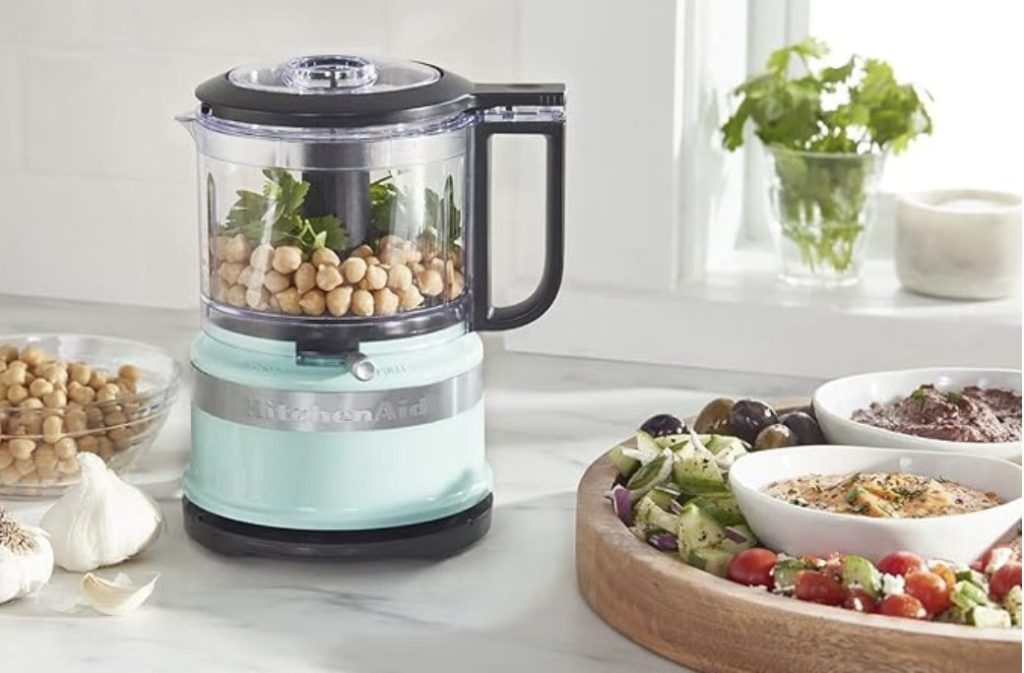
KitchenAid Food Processor: Overview
To give you an overview of the KitchenAid food processor, let’s dive into its key features and capabilities.
KitchenAid food processors are known for their premium design and exceptional performance. They prioritize build quality with durable materials, making them stylish additions to any kitchen.
 4.6
4.6$99.99$89.99Buy NowPros:- The 7-cup capacity strikes a balance between compactness and functionality, making it suitable for everyday use and moderate-sized food preparation tasks.
- Multi-Functionality
- Compact Design
- Simple controls and user-friendly design.
- Empire Red Aesthetic
- Reasonably Priced
Cons:- Limited Capacity
- While capable of essential tasks, it may lack some of the advanced functions found in larger, more expensive food processors.
- The motor may not be as powerful as larger models.
- Noise Level
- Some users may prefer a more robust construction, as this model features a predominantly plastic build.
03/29/2025 08:02 pm GMT 4.5
4.5$69.99$64.99Buy NowPros:- Moderate Capacity
- Compact Design
- Quick and Efficient Chopping
- Simple one-touch operation ensures user-friendly functionality.
- Matte Black Finish
- Affordability
Cons:- Limited Capacity
- Basic Functions
- Motor Power
- Noisy Operation
- Some users may prefer a more robust construction, as this model features a predominantly plastic build.
03/29/2025 08:01 pm GMT 4.6
4.6$59.99$54.99Buy NowPros:- The 3.5-cup capacity is ideal for smaller kitchen spaces and everyday food preparation needs without taking up excessive counter space.
- Efficient Chopping
- User-Friendly Design
- Removable parts, including the blade and bowl, are dishwasher-safe, ensuring easy and convenient cleanup.
- Affordable
Cons:- Limited Capacity
- While efficient for chopping, it may lack some of the advanced functions and versatility of larger, more expensive food processors.
- The motor may not be as powerful as larger models.
- Noisy Operation
- Limited Accessories
- Plastic Construction
03/29/2025 08:02 pm GMT
In terms of performance and functionality, KitchenAid food processors deliver consistent and reliable results with their powerful motors. They offer multiple speed options for customized processing speed and come with a range of blades and attachments for versatile food preparation.
When it comes to user convenience, KitchenAid models have large feed tubes and intuitive controls, making them accessible to both novice and experienced cooks.
While KitchenAid food processors tend to be on the higher end of the price spectrum, they offer excellent value for money with their performance and functionality.
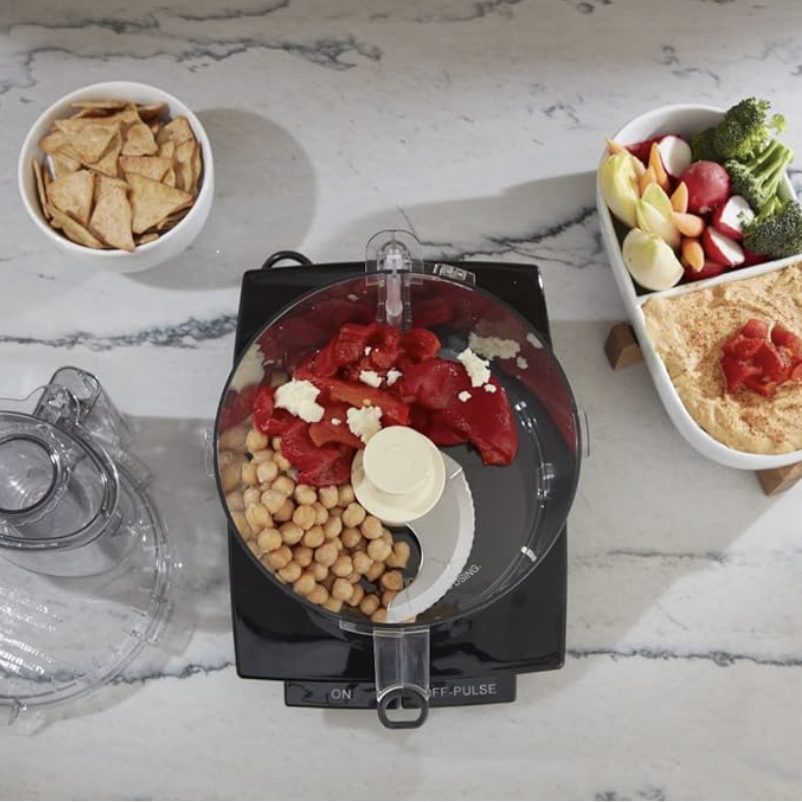
Design and Build Comparison
Moving on to the comparison of design and build, let’s take a closer look at the features and construction of both Cuisinart and KitchenAid food processors.
- Cuisinart models are known for their sturdy construction and reliable performance.
- KitchenAid models have a premium look and feel, making them stylish additions to any kitchen.
- Both brands prioritize build quality with durable materials.
When it comes to design and build, it ultimately comes down to personal preference. If you prefer a more robust and reliable option, Cuisinart may be the better choice. However, if you value a sleek and stylish design, KitchenAid might be more appealing.
Consider the design and build quality that aligns with your preferences to make an informed decision.
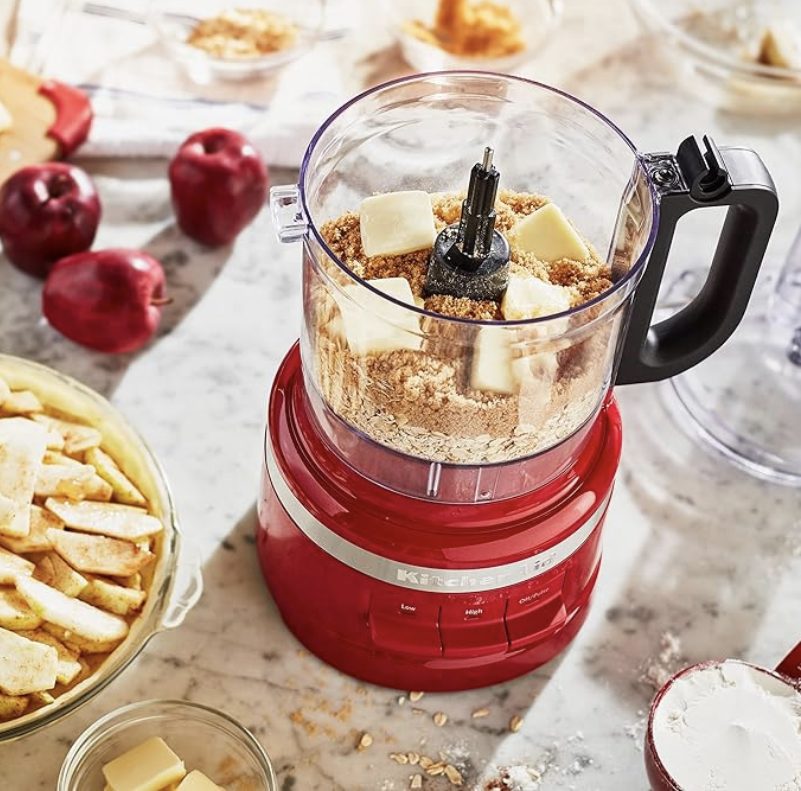
Features & Specification Comparison
Now let’s compare the features and specifications of the Cuisinart and Kitchenaid food processors.
We’ll look at the speed and power, blade and attachment options, size and capacity, feed tube design, and user-friendly controls.
Speed and Power
Comparing the speed and power of the Cuisinart and KitchenAid food processors reveals key differences in their features and specifications.
- Speed: KitchenAid offers low, high, and pulse speeds, while Cuisinart has on and pulse options.
- Power: Cuisinart boasts a more powerful 600-watt motor compared to KitchenAid’s 300-watt motor.
- Performance: Cuisinart is better suited for heavy-duty tasks like chopping and dough mixing due to its higher wattage.
These differences in speed and power can significantly impact the performance and capabilities of the food processors. The KitchenAid processor may be more suitable for lighter tasks, while the Cuisinart processor is better equipped for heavier, more demanding tasks.
Consider your specific cooking needs and preferences when choosing between the two models.
Blade and Attachment Options
To further explore the features and specifications of the Cuisinart and KitchenAid food processors, let’s delve into their blade and attachment options.
Both brands offer a range of blades and attachments to enhance the versatility of their food processors. Both processors come with an S-shaped chopping blade, shredding disk, and slicing disk.
The chopping blade is suitable for coarse chopping and dough mixing, while the shredding disk is ideal for coleslaw, salads, and stir fry. The slicing disk allows for thin slicing, like potato chips.
Additionally, both brands offer multiple size options, ranging from 3-cup to 14-cup capacities, and they both feature dual-size feeding tubes for easy food insertion.
Size and Capacity
Moving on to the size and capacity of the Cuisinart and KitchenAid food processors, let’s compare their features and specifications:
- Size: Both brands offer various sizes, ranging from 3-cup to 14-cup capacities. The 11-cup size is popular.
- Slim Design: Cuisinart is slimmer and suitable for small kitchens.
- Feeding Tubes: Dual-size feeding tubes are available in both models.
When considering the size and capacity of these food processors, it’s important to take into account the amount of food you typically prepare and the available space in your kitchen. The different size options offered by both Cuisinart and KitchenAid allow you to choose the one that best suits your needs.
Furthermore, the slim design of the Cuisinart food processors makes them ideal for smaller kitchens where counter space may be limited. The presence of dual-size feeding tubes in both models provides flexibility in processing different sizes of ingredients.
Feed Tube Design
When considering the feed tube design of the Cuisinart and KitchenAid food processors, it’s essential to evaluate their features and specifications.
The feed tube is an important component as it determines the size of the ingredients that can be inserted without pre-cutting.
Cuisinart processors are known for their extra-large feed tubes, allowing whole fruits and vegetables to be inserted easily.
On the other hand, KitchenAid processors may have a wider feed tube, making it more user-friendly for certain types of food preparation.
It’s important to consider the size of the feed tube and its impact on your cooking needs.
While Cuisinart processors may require cutting food to fit the feed tube, KitchenAid processors may offer a more convenient feeding experience.



Konnichiwa! (Hello!) I'm Pat Tokuyama, a Japanese tofu cookbook author, who travels for music, food, and adventure. If you like Japanese tea, checkout some of the newestorganic japanese tea, matcha bowls and noren and more!
** Curious about the Plant Based Japanese Cooking Club? ** Learn more here!
User-Friendly Controls
You can easily compare the user-friendly controls and features of the Cuisinart and KitchenAid food processors. When it comes to user convenience, both brands prioritize ease of use and intuitive controls. Here are some key points to consider:
- Cuisinart food processors have large feed tubes for inserting whole fruits and vegetables without pre-cutting.
- KitchenAid models feature large feed tubes and clear labeling on controls for user-friendliness.
- Both brands offer pulse functions for precise control over processing consistency.
These user-friendly features make both the Cuisinart and KitchenAid food processors accessible to both novice and experienced cooks. By considering these aspects, you can choose the food processor that best suits your needs and preferences.
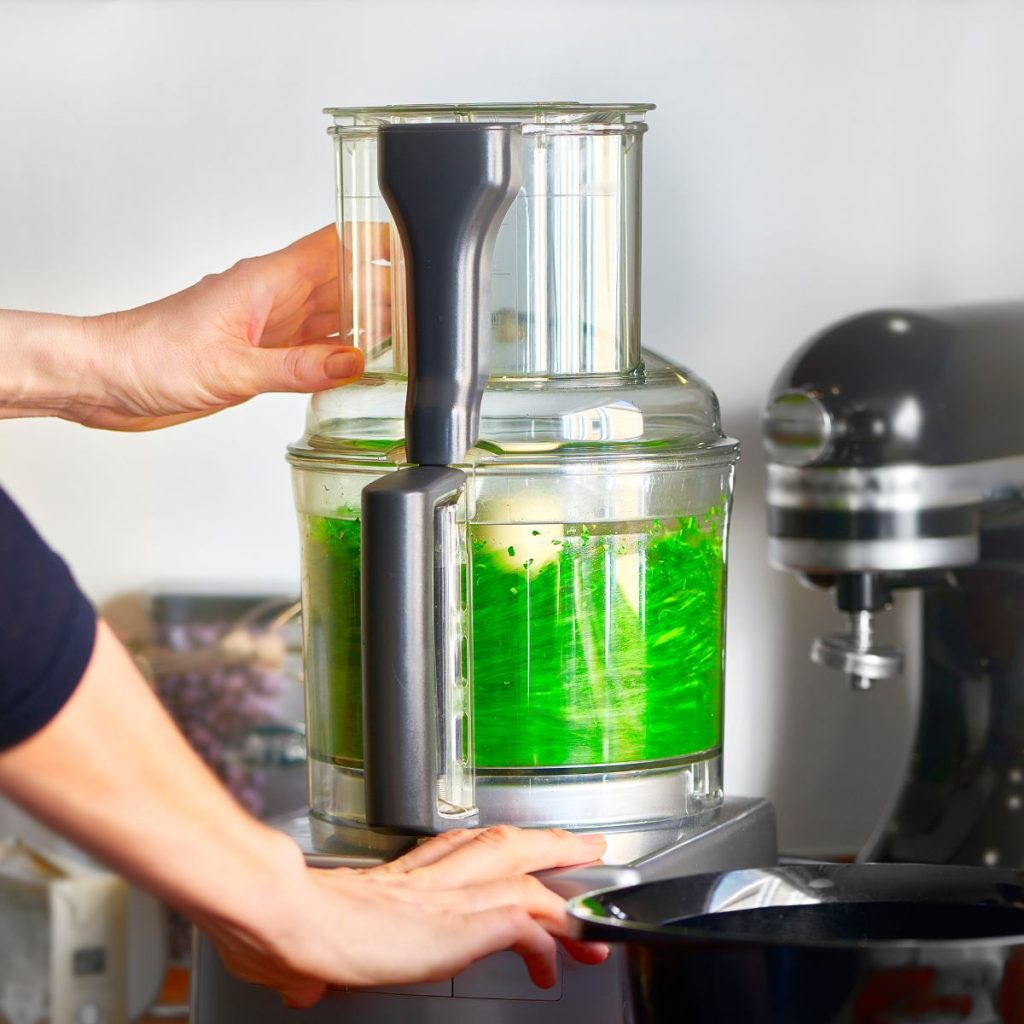
Performance Comparison
How does the performance of Cuisinart and Kitchenaid food processors compare?
When it comes to performance, both Cuisinart and Kitchenaid offer reliable and efficient food processors.
Cuisinart processors are known for their powerful motors, ranging from 350 to 720 watts, making them suitable for heavy-duty tasks like kneading dough.
On the other hand, Kitchenaid processors have a slightly lower wattage, ranging from 300 to 550 watts, but they still deliver exceptional performance, including the ability to handle tough tasks like kneading dough.
Both brands offer multiple speed options for customized processing speed, allowing you to achieve the desired consistency for your recipes.
Value Comparison
To determine the value comparison between Cuisinart and Kitchenaid food processors, let’s take a closer look at their price points and the features they offer.
- Price Points: Cuisinart food processors generally have a more affordable price range compared to Kitchenaid models.
- Features: Both brands offer a range of features, including multiple speed options, various sizes and colors, and versatile attachments. However, Kitchenaid stands out with its UltraTight seal system and ExactSlice system, while Cuisinart offers an extra-large feed tube and powerful motors ranging from 350 to 720 watts.
When considering value for money, Cuisinart food processors provide excellent performance and functionality at a more affordable price point. On the other hand, Kitchenaid processors offer premium design, exceptional performance, and innovative features, but at a higher price.
Ultimately, the choice between the two brands depends on your specific needs, preferences, and budget.

Cuisinart Vs KitchenAid Food Processor: The Verdict
When considering the comparison between Cuisinart and KitchenAid food processors, the verdict ultimately depends on your specific needs, preferences, and budget. Both brands offer high-quality food processors with reliable performance and durable build quality.
Cuisinart provides excellent value for money with its powerful motors and versatile functionality. On the other hand, KitchenAid stands out with its premium design, exceptional performance, and innovative features.
It’s important to consider factors such as design and build quality, performance and functionality, user convenience, and price and value for money. Both brands have their strengths and weaknesses, so it’s crucial to evaluate your cooking needs and preferences before making a decision.
Ultimately, the choice between Cuisinart and KitchenAid will depend on what matters most to you in a food processor.


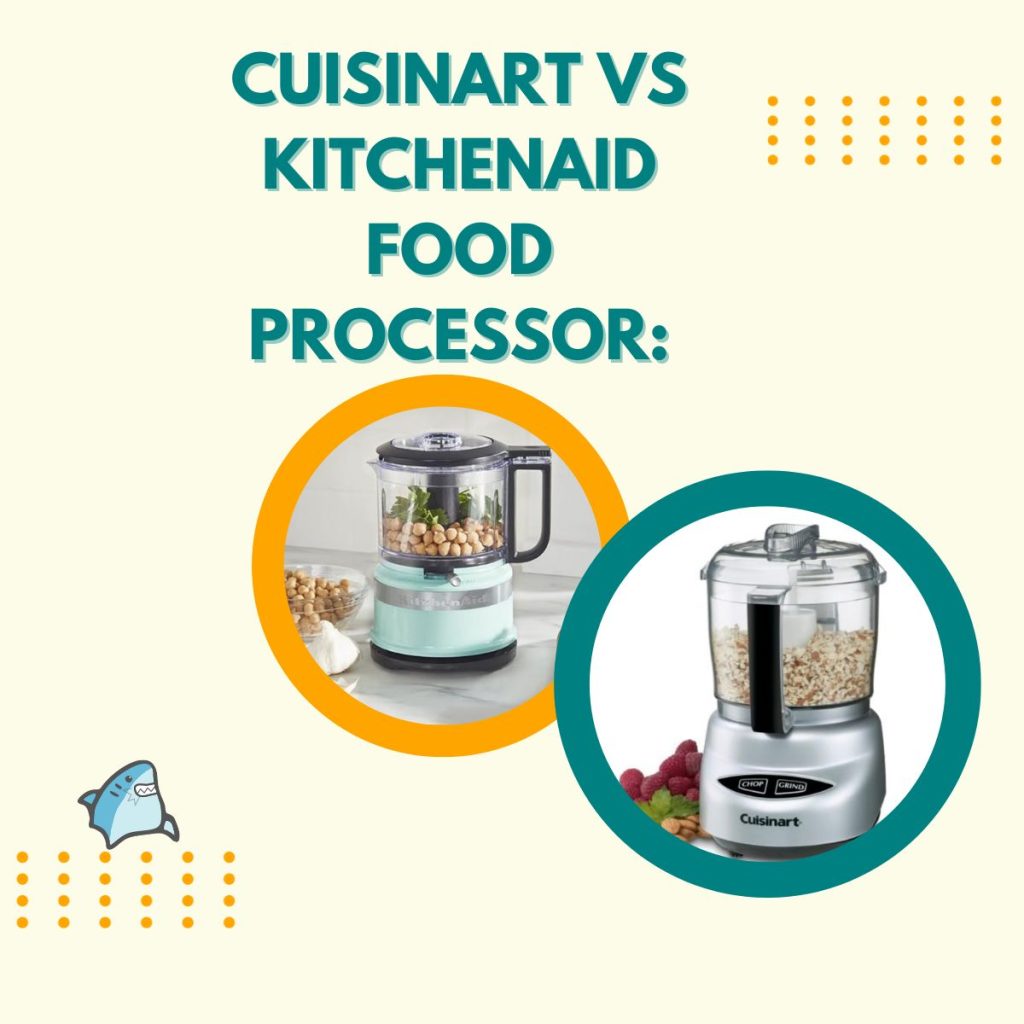








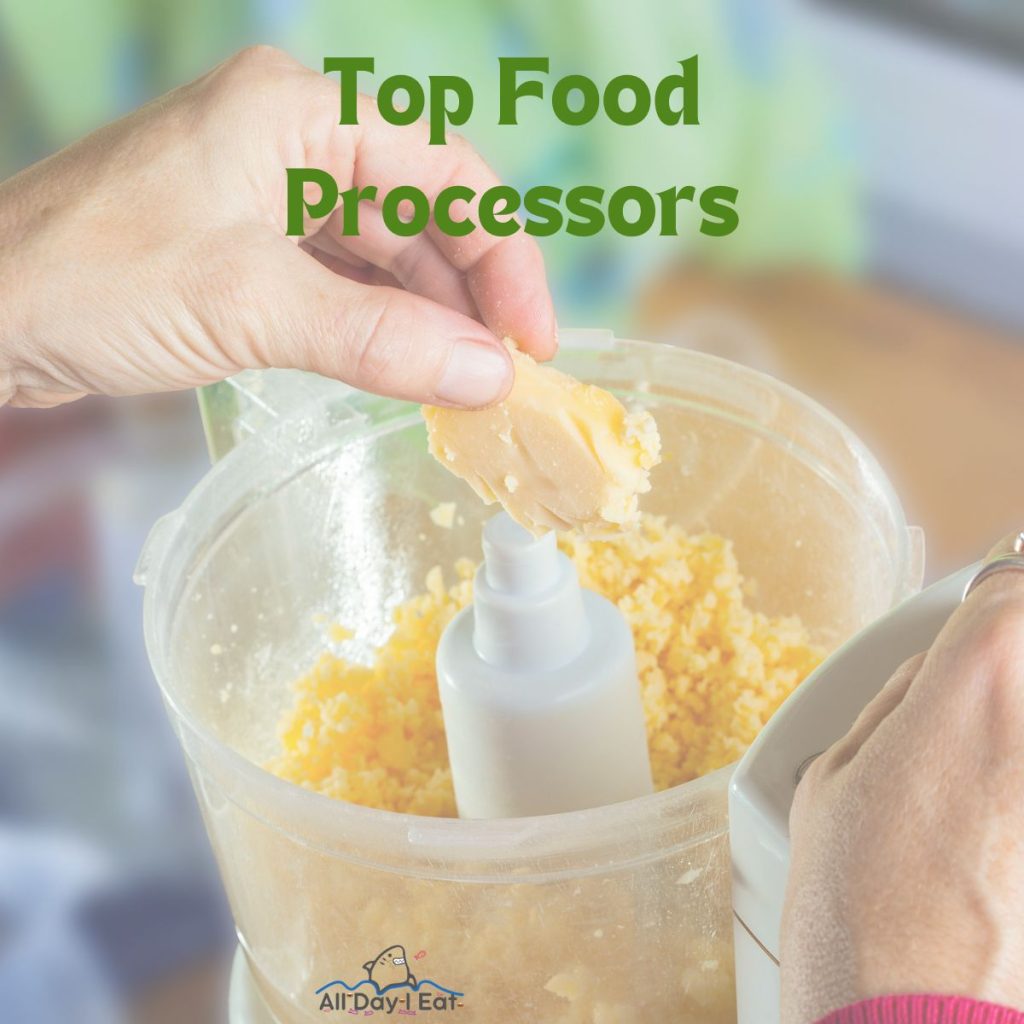
Konnichiwa! (Hello!) I'm Pat Tokuyama, a Japanese tofu cookbook author, who travels for music, food, and adventure. If you like Japanese tea, checkout some of the newestorganic japanese tea, matcha bowls and noren and more!
** Curious about the Plant Based Japanese Cooking Club? ** Learn more here!